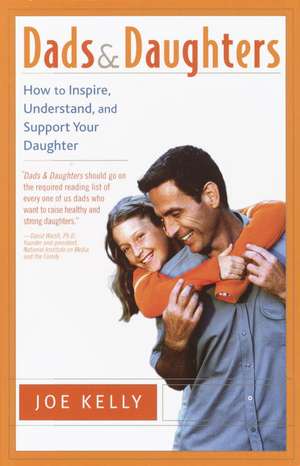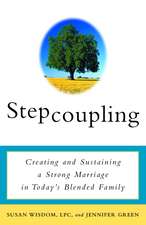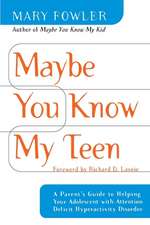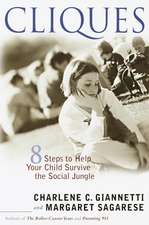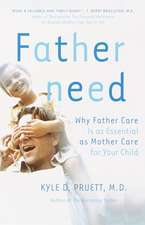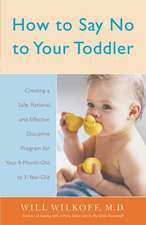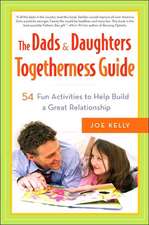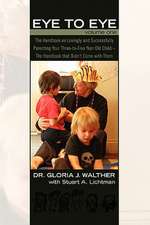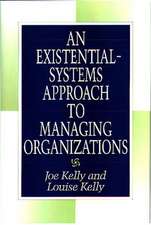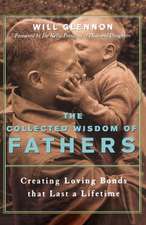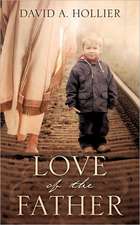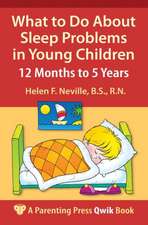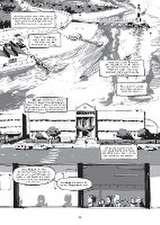Dads and Daughters: How to Inspire, Understand, and Support Your Daughter When She's Growing Up So Fast
Autor Joe Kellyen Limba Engleză Paperback – 30 apr 2003
Vezi toate premiile Carte premiată
NAPPA Gold Awards (2002)
As the primary male role model in a girl’s life, fathers influence their daughters in profound ways, from how they see themselves to what they come to expect from men and the world at large. But men often don’t realize the importance of their interactions or may shy away from too close involvement because of their inexperience, or conditioning. Especially as girls move into adolescence, fathers may find themselves feeling distant from their daughters or awkward with the changing dynamic. Communication becomes difficult and parenting issues more complicated. But this is also the time when daughters most need their fathers to be an even greater presence in their lives. Dads and Daughters is a tool to bridge that gap and build a rewarding and joyful father-daughter relationship.
From father to father and with insights from many other dads, Joe Kelly shows men how they can strengthen their relationships with their daughters and explores the tremendous rewards this relationship can bring. Starting with a self-assessment quiz titled “How Am I Doing as My Daughter’s Father?” dads can immediately see what kind of role they play in their daughter’s life. To educate fathers and offer solutions when problems arise, Dads and Daughters then offers thoughtful coverage of the most pivotal issues today’s girls face, such as sex and dating, body image, alcohol and drugs, media culture and violence, money and responsibility, and the future. In doing so he both illuminates the culture our daughters live in and shows fathers how to guide their daughters toward rewarding, healthy lives.
From the Hardcover edition.
Preț: 95.51 lei
Nou
Puncte Express: 143
Preț estimativ în valută:
18.28€ • 19.85$ • 15.35£
18.28€ • 19.85$ • 15.35£
Carte disponibilă
Livrare economică 01-15 aprilie
Preluare comenzi: 021 569.72.76
Specificații
ISBN-13: 9780767908344
ISBN-10: 0767908341
Pagini: 276
Dimensiuni: 135 x 205 x 15 mm
Greutate: 0.21 kg
Editura: HARMONY
ISBN-10: 0767908341
Pagini: 276
Dimensiuni: 135 x 205 x 15 mm
Greutate: 0.21 kg
Editura: HARMONY
Notă biografică
Former journalist Joe Kelly is the executive director of Dads and Daughters and father of twin adult daughters. His work has been extensively featured in the media, including NPR, CBS, ABC, People, USA Today, and the New York Times. He was awarded the 1995 Parenting Achievement Award from Parenting magazine and helped his wife, Nancy Gruver, launch New Moon, the award-winning international magazine edited by girls. He lives in Duluth, Minnesota.
From the Hardcover edition.
From the Hardcover edition.
Extras
1.
"I DON'T KNOW WHAT SHE WANTS FROM ME.": BUILDING A FATHER-DAUGHTER RELATIONSHIP
Perhaps every father should be issued a football mouthguard when his daughter is born, since he's liable to spend the next few decades biting his tongue.
When my daughter Nia was thirteen, she announced that she was going to dye her hair orange. In the following split second, a volcano of emotions and objections exploded in my gut. If, at the last possible instant, I hadn't bitten my tongue, here's what I would have blurted out:
1.Oh no, you don't! No daughter of mine is going to look like a freak or a punk!
2.What is wrong with you?
3.You're so pretty; don't mess it up.
4.For years I've been working so hard to instill in you that your appearance doesn't matter as much as what's inside. And this is how you repay me? First, you start wearing a little makeup (without telling me) and now you want to dye your hair? And dye it orange?!?
5.I'm a failure as a father. You have completely caved in to seventh-grade peer pressure.
6.How dare you dye your hair without asking my permission first?
7.What's happening to my little girl?
Fortunately for me (and both of my daughters), another, louder voice caught my internal ear just before I opened my mouth to let her have it. That voice cried: Pick your battles! I thought to myself, It's only her hair. How much energy did my father and I waste arguing about the length of my hair at thirteen? What real difference does it make? At least she told me and didn't just show up with an orange fait accompli.
And then, finally, my teeth freed my tongue and out came a sparkling, insightful response.
"Oh," I said. "When?"
"We're gonna do it tomorrow night after school."
"Oh," I said (repeating my eloquence while scrambling for what to say next). "What are you using?"
"Stuff from Walgreen's. It washes out after seven showers or something."
"Oh," I replied (Tip 1: Once you discover a good fathering phrase, keep using it), "okay."
I still wasn't happy about the idea of orange hair, but I decided not to raise a stink. I also decided not to be terrifically supportive--or even hang around the house--when the deed was done. The next day after school, though, my curiosity won out. I went to the bathroom to watch as Nia sat on the edge on the tub with an old towel draped over her shoulders. Her sister, Mavis, donned clear plastic gloves, squeezed some garish goo out of a tube, and started working it into Nia's wet hair. The whole scene looked a bit wild and ridiculous. Again I had to bite my tongue, this time to keep from giggling.
The girls were having fun, but also taking the task quite seriously. In addition, they kept their antennae up for objections or snide comments from Mom or Dad. Since it was their first time mounting such an elaborate home beauty salon, there were false starts and several "Oops! Gotta try it again" moments. Soon, all four of us were giggling and I goofily stuck my head over to see if they'd put some dye in my thinning hair. That's the moment when Mom snapped a photograph that I now have framed on my bookshelf.
In the years since, this photo has accompanied numerous media stories about my work and me. Magazine and newspapers choose it because it's a funny, animated image. But it's important to me because it captures a significant moment in my development as the father of daughters. In twenty-four hours, I'd journeyed from wanting to angrily reject Nia's decision to accepting--and even enjoying--her choice. Dyeing hair in the bathroom may not seem like a major turning point in anyone's life, but in that minor moment, I discovered a major capacity to accept how Nia's journey is different than mine--because she is a girl.
My daughters' concern with their appearance was not as intense as many of their peers, but it was real and important to them. Even though I didn't really understand why they cared so much about how they looked--and passionately wished that they would care not at all--I needed to accept that they cared in order to accept them.
Even better, while participating in the silly bathroom scene, I began to celebrate how my daughters and their journeys are their own, not mine. Freed from my initial, enraged knee-jerk reaction, I saw that Nia's orange-dye decision sprang less from peer pressure than from experimenting with who she wants to be. I was proud of how womanly the girls acted by doing all the dyeing themselves--and was also secretly happy when Nia's dark brown hair so overpowered the orange dye that it required a little white lie to say, "Oh, of course I can see it!"
Today I treasure this snapshot because it shows my girls' independence, my faith in their judgment, and how much I enjoy being their father. I also treasure it because it reminds me how different it is to be a girl.
FATHERING A DAUGHTER
I'm really struggling with the fact that I don't think that I verbalize how wonderful my daughters are often enough. I do tell them, but it does not flow spontaneously from my being. I don't have the training or the modeling for it. I'll say, "Good job!" But I also don't want it to be a "job." You know--the idea that you have value because you did something. That has been my toughest thing. Maybe just sitting with them with my arm around them, maybe that's telling them how special they are to me. I'm not sure. I have very little confidence about myself.
Henry
Our impact as fathers on our daughters is astounding. We may sense this truth, but not fully understand it. Often, we can't understand our daughters at all. Having grown up as boys, we are in the dark about what it's like to be a girl. Fathers ask me this question all the time: Do you ever feel like you don't know why these girls are acting the way they are? I feel like I'm living on another planet.
Sure, most of us spend a lot of time with females: colleagues, mothers, sisters, girlfriends, aunts, wives, and partners. But daughters affect us with greater intensity than any other female in our lives. We might be able to articulate a little bit how our life has changed (should anyone bother to ask), but the picture is often fuzzy. We worry that we're not doing things right, not preparing her well enough, not getting through to her, and that's scary.
The other night, my sixteen-year-old daughter was in a lot of pain. She pulled something playing hockey and the doctor gave her a shot of cortisone. She had a bad reaction to it, and was getting almost hysterical, hyperventilating. Her mother couldn't deal with it, so I tried to calm her down. I told her to breathe into a paper bag, to slow her breathing, to relax. No matter what I said, it seemed to make the situation worse. She accused me of yelling at her, told me to leave, she only wanted her mother. Finally, we took her to the emergency room, where the doctor instantly got her to breathe into a paper bag. It was so frustrating. Why couldn't I get her to listen? Am I not sensitive enough? I feel as if no matter what I do, it's not the right thing. I'm worried that she's starting to flounder. Getting hurt and quitting hockey is not a good sign. I think she's scared of all the decisions she's going to have to start making, and I'm scared that I haven't prepared her well enough. Have I not given her the right tools to make her way in life? What am I supposed to be giving her? I don't know what she wants from me.
Randall
In these intense emotional moments--whether fear or joyous pride--we know that our life has been fundamentally changed because we're raising (or have raised) a child who is female.
Throughout this book, the voices of many fathers' experiences show that none of us fathers is alone. These voices illustrate the immense power of the daughter-father relationship, how influential this relationship is from the very beginning of a girl's life, and the influence a father-daughter pair can have on everyone around them.
We don't hear much talk about the influence of fathers on daughters. It's much more common to hear about how girls are influenced by their mothers. But all it takes is a moment's reflection to start realizing the huge impact we fathers have on every one of our daughters. To find the roots of a father's influence, think of your own daughter. It's normal and natural that she wants to know what's interesting to, or gets the attention of, members of the opposite sex. That's important knowledge for her to have even if she never dates a boy or marries a man, because she lives in a world half full of boys and men.
Where will she turn first for this information? Most often, she'll turn to the first member of the opposite sex she gets to know: Dad. Even a stepfather, while not always the first male a girl knows, has a huge influence because he spends so much time with her. So the way we act toward our daughters and the other females in her life is what she will expect from boys and men. The same is true for our attitudes, words, and beliefs. In all of these, we represent to her the richness, honor, and value of being a man. When we are true to her and true to the best in our masculine heritage, she will learn to respect men and treat them as equals. She will learn to gravitate toward men who respect her and treat her as an equal, while turning away from men who threaten, violate, and abuse. That's good for both a daughter and her father. Perhaps that's what's behind the old saying: When a girl grows up, she marries her father. Her life partner is very likely to reflect her dad's characteristics. As one woman put it:
My father is my one role model as far as male, human behavior. And I really compare all other men in the world to my father. He is the most loving, the most accepting, the most honorable, the most responsible, the most nurturing--one of the greatest humanitarians I've ever known. He is the model that I judge all other men by--fair or not fair. Having this kind of relationship with him has given me a lot of trust, and it's given me a lot of nurturing and guidance. That love and support and encouragement I had through those years, and continue to have, has made me a much stronger person.
Julia
We have great influence on our daughters and many choices about how to use it. We can send our daughters down their life roads with clear and healthy expectations for men, or leave our daughters lost in tangled underbrush, confused about what to accept from men. They will probably be drawn toward men who choose paths similar to the ones we tread as men and fathers. What does that mean for us? At minimum, it means being an integral part of our daughters' lives, not abandoning them to wander into the world of boys and men without our example of strong, supportive, and nurturing masculinity. Our example is the road map our daughters use to discover relationships (romantic or not) with boys and men we'd be proud to have as sons and brothers.
Fatherly influence reaches many parts of a daughter's life. Research demonstrates how important fathers are in the career and academic success of girls. Involved fathers show daughters ways to navigate the world outside the family, are role models of independence and competency, and are a moral anchor for them. We affect our daughters in thousands of ways, and we'll talk about many of them during the course of the book.
When we first reflect on the enormity of this influence and responsibility, it can seem overwhelming--even oppressive. As one dad told me, "If I screw up, that means she's going to spend the rest of her life with a screw-up. I don't want that!" Well, don't despair and don't give up. We can do the job well, even if we sometimes feel like we're completely in the dark. There's no magic formula for fathers to follow, but talking to each other sheds light on how to proceed--recognizing that fathering is far more art than it is science.
My own daughter recently recalled an example of a fathering moment in which I got to practice what I preach:
One of my earliest memories is of you sewing new backing on our baby blankets. We couldn't have been more than two years old. And that backing held up for the next nineteen years. But last year you were in a hurry, and accidentally grabbed my blanky and packed it off to a garage sale. When I discovered it was missing, I was very upset, even though I did my best to not make you feel bad about it--mistakes happen. But then, a couple weeks later, I got a box in the mail at college. Inside was a new blanky. You picked out the fabric, and pieced it all together, and learned to use the sewing machine to make it for me. And it's beautiful! But what really makes it special is that you stopped kicking yourself about making that mistake, and instead set about doing something special to make me happy and let me know how much you love me.
Mavis
True fathering is a unique and powerful contribution to a daughter--one that Will Glennon, in his book Fathering, describes as a miracle.
True fathering is not the physical act of planting a seed, it is the conscious decision to tend and nourish the seedling. Real fathering is not biological--it is the conscious choice to build an unconditional and unbreakable connection to another human being. Once that choice is made, it cannot be unmade.
WHAT I'VE LEARNED
Fathers are most successful when we view the influence we have on our daughters as an opportunity as well as an obligation. But many of us don't see the opportunity or can't figure out how to use it wisely through the daily confusion clouding who our daughters are and what's going on with them.
Fathers with daughters have a wildly contradictory set of visceral feelings about raising girls.
* We want to protect our daughter more than anyone else who has ever been part of our lives. Yet we often feel as if there's no way that we can.
From the Hardcover edition.
"I DON'T KNOW WHAT SHE WANTS FROM ME.": BUILDING A FATHER-DAUGHTER RELATIONSHIP
Perhaps every father should be issued a football mouthguard when his daughter is born, since he's liable to spend the next few decades biting his tongue.
When my daughter Nia was thirteen, she announced that she was going to dye her hair orange. In the following split second, a volcano of emotions and objections exploded in my gut. If, at the last possible instant, I hadn't bitten my tongue, here's what I would have blurted out:
1.Oh no, you don't! No daughter of mine is going to look like a freak or a punk!
2.What is wrong with you?
3.You're so pretty; don't mess it up.
4.For years I've been working so hard to instill in you that your appearance doesn't matter as much as what's inside. And this is how you repay me? First, you start wearing a little makeup (without telling me) and now you want to dye your hair? And dye it orange?!?
5.I'm a failure as a father. You have completely caved in to seventh-grade peer pressure.
6.How dare you dye your hair without asking my permission first?
7.What's happening to my little girl?
Fortunately for me (and both of my daughters), another, louder voice caught my internal ear just before I opened my mouth to let her have it. That voice cried: Pick your battles! I thought to myself, It's only her hair. How much energy did my father and I waste arguing about the length of my hair at thirteen? What real difference does it make? At least she told me and didn't just show up with an orange fait accompli.
And then, finally, my teeth freed my tongue and out came a sparkling, insightful response.
"Oh," I said. "When?"
"We're gonna do it tomorrow night after school."
"Oh," I said (repeating my eloquence while scrambling for what to say next). "What are you using?"
"Stuff from Walgreen's. It washes out after seven showers or something."
"Oh," I replied (Tip 1: Once you discover a good fathering phrase, keep using it), "okay."
I still wasn't happy about the idea of orange hair, but I decided not to raise a stink. I also decided not to be terrifically supportive--or even hang around the house--when the deed was done. The next day after school, though, my curiosity won out. I went to the bathroom to watch as Nia sat on the edge on the tub with an old towel draped over her shoulders. Her sister, Mavis, donned clear plastic gloves, squeezed some garish goo out of a tube, and started working it into Nia's wet hair. The whole scene looked a bit wild and ridiculous. Again I had to bite my tongue, this time to keep from giggling.
The girls were having fun, but also taking the task quite seriously. In addition, they kept their antennae up for objections or snide comments from Mom or Dad. Since it was their first time mounting such an elaborate home beauty salon, there were false starts and several "Oops! Gotta try it again" moments. Soon, all four of us were giggling and I goofily stuck my head over to see if they'd put some dye in my thinning hair. That's the moment when Mom snapped a photograph that I now have framed on my bookshelf.
In the years since, this photo has accompanied numerous media stories about my work and me. Magazine and newspapers choose it because it's a funny, animated image. But it's important to me because it captures a significant moment in my development as the father of daughters. In twenty-four hours, I'd journeyed from wanting to angrily reject Nia's decision to accepting--and even enjoying--her choice. Dyeing hair in the bathroom may not seem like a major turning point in anyone's life, but in that minor moment, I discovered a major capacity to accept how Nia's journey is different than mine--because she is a girl.
My daughters' concern with their appearance was not as intense as many of their peers, but it was real and important to them. Even though I didn't really understand why they cared so much about how they looked--and passionately wished that they would care not at all--I needed to accept that they cared in order to accept them.
Even better, while participating in the silly bathroom scene, I began to celebrate how my daughters and their journeys are their own, not mine. Freed from my initial, enraged knee-jerk reaction, I saw that Nia's orange-dye decision sprang less from peer pressure than from experimenting with who she wants to be. I was proud of how womanly the girls acted by doing all the dyeing themselves--and was also secretly happy when Nia's dark brown hair so overpowered the orange dye that it required a little white lie to say, "Oh, of course I can see it!"
Today I treasure this snapshot because it shows my girls' independence, my faith in their judgment, and how much I enjoy being their father. I also treasure it because it reminds me how different it is to be a girl.
FATHERING A DAUGHTER
I'm really struggling with the fact that I don't think that I verbalize how wonderful my daughters are often enough. I do tell them, but it does not flow spontaneously from my being. I don't have the training or the modeling for it. I'll say, "Good job!" But I also don't want it to be a "job." You know--the idea that you have value because you did something. That has been my toughest thing. Maybe just sitting with them with my arm around them, maybe that's telling them how special they are to me. I'm not sure. I have very little confidence about myself.
Henry
Our impact as fathers on our daughters is astounding. We may sense this truth, but not fully understand it. Often, we can't understand our daughters at all. Having grown up as boys, we are in the dark about what it's like to be a girl. Fathers ask me this question all the time: Do you ever feel like you don't know why these girls are acting the way they are? I feel like I'm living on another planet.
Sure, most of us spend a lot of time with females: colleagues, mothers, sisters, girlfriends, aunts, wives, and partners. But daughters affect us with greater intensity than any other female in our lives. We might be able to articulate a little bit how our life has changed (should anyone bother to ask), but the picture is often fuzzy. We worry that we're not doing things right, not preparing her well enough, not getting through to her, and that's scary.
The other night, my sixteen-year-old daughter was in a lot of pain. She pulled something playing hockey and the doctor gave her a shot of cortisone. She had a bad reaction to it, and was getting almost hysterical, hyperventilating. Her mother couldn't deal with it, so I tried to calm her down. I told her to breathe into a paper bag, to slow her breathing, to relax. No matter what I said, it seemed to make the situation worse. She accused me of yelling at her, told me to leave, she only wanted her mother. Finally, we took her to the emergency room, where the doctor instantly got her to breathe into a paper bag. It was so frustrating. Why couldn't I get her to listen? Am I not sensitive enough? I feel as if no matter what I do, it's not the right thing. I'm worried that she's starting to flounder. Getting hurt and quitting hockey is not a good sign. I think she's scared of all the decisions she's going to have to start making, and I'm scared that I haven't prepared her well enough. Have I not given her the right tools to make her way in life? What am I supposed to be giving her? I don't know what she wants from me.
Randall
In these intense emotional moments--whether fear or joyous pride--we know that our life has been fundamentally changed because we're raising (or have raised) a child who is female.
Throughout this book, the voices of many fathers' experiences show that none of us fathers is alone. These voices illustrate the immense power of the daughter-father relationship, how influential this relationship is from the very beginning of a girl's life, and the influence a father-daughter pair can have on everyone around them.
We don't hear much talk about the influence of fathers on daughters. It's much more common to hear about how girls are influenced by their mothers. But all it takes is a moment's reflection to start realizing the huge impact we fathers have on every one of our daughters. To find the roots of a father's influence, think of your own daughter. It's normal and natural that she wants to know what's interesting to, or gets the attention of, members of the opposite sex. That's important knowledge for her to have even if she never dates a boy or marries a man, because she lives in a world half full of boys and men.
Where will she turn first for this information? Most often, she'll turn to the first member of the opposite sex she gets to know: Dad. Even a stepfather, while not always the first male a girl knows, has a huge influence because he spends so much time with her. So the way we act toward our daughters and the other females in her life is what she will expect from boys and men. The same is true for our attitudes, words, and beliefs. In all of these, we represent to her the richness, honor, and value of being a man. When we are true to her and true to the best in our masculine heritage, she will learn to respect men and treat them as equals. She will learn to gravitate toward men who respect her and treat her as an equal, while turning away from men who threaten, violate, and abuse. That's good for both a daughter and her father. Perhaps that's what's behind the old saying: When a girl grows up, she marries her father. Her life partner is very likely to reflect her dad's characteristics. As one woman put it:
My father is my one role model as far as male, human behavior. And I really compare all other men in the world to my father. He is the most loving, the most accepting, the most honorable, the most responsible, the most nurturing--one of the greatest humanitarians I've ever known. He is the model that I judge all other men by--fair or not fair. Having this kind of relationship with him has given me a lot of trust, and it's given me a lot of nurturing and guidance. That love and support and encouragement I had through those years, and continue to have, has made me a much stronger person.
Julia
We have great influence on our daughters and many choices about how to use it. We can send our daughters down their life roads with clear and healthy expectations for men, or leave our daughters lost in tangled underbrush, confused about what to accept from men. They will probably be drawn toward men who choose paths similar to the ones we tread as men and fathers. What does that mean for us? At minimum, it means being an integral part of our daughters' lives, not abandoning them to wander into the world of boys and men without our example of strong, supportive, and nurturing masculinity. Our example is the road map our daughters use to discover relationships (romantic or not) with boys and men we'd be proud to have as sons and brothers.
Fatherly influence reaches many parts of a daughter's life. Research demonstrates how important fathers are in the career and academic success of girls. Involved fathers show daughters ways to navigate the world outside the family, are role models of independence and competency, and are a moral anchor for them. We affect our daughters in thousands of ways, and we'll talk about many of them during the course of the book.
When we first reflect on the enormity of this influence and responsibility, it can seem overwhelming--even oppressive. As one dad told me, "If I screw up, that means she's going to spend the rest of her life with a screw-up. I don't want that!" Well, don't despair and don't give up. We can do the job well, even if we sometimes feel like we're completely in the dark. There's no magic formula for fathers to follow, but talking to each other sheds light on how to proceed--recognizing that fathering is far more art than it is science.
My own daughter recently recalled an example of a fathering moment in which I got to practice what I preach:
One of my earliest memories is of you sewing new backing on our baby blankets. We couldn't have been more than two years old. And that backing held up for the next nineteen years. But last year you were in a hurry, and accidentally grabbed my blanky and packed it off to a garage sale. When I discovered it was missing, I was very upset, even though I did my best to not make you feel bad about it--mistakes happen. But then, a couple weeks later, I got a box in the mail at college. Inside was a new blanky. You picked out the fabric, and pieced it all together, and learned to use the sewing machine to make it for me. And it's beautiful! But what really makes it special is that you stopped kicking yourself about making that mistake, and instead set about doing something special to make me happy and let me know how much you love me.
Mavis
True fathering is a unique and powerful contribution to a daughter--one that Will Glennon, in his book Fathering, describes as a miracle.
True fathering is not the physical act of planting a seed, it is the conscious decision to tend and nourish the seedling. Real fathering is not biological--it is the conscious choice to build an unconditional and unbreakable connection to another human being. Once that choice is made, it cannot be unmade.
WHAT I'VE LEARNED
Fathers are most successful when we view the influence we have on our daughters as an opportunity as well as an obligation. But many of us don't see the opportunity or can't figure out how to use it wisely through the daily confusion clouding who our daughters are and what's going on with them.
Fathers with daughters have a wildly contradictory set of visceral feelings about raising girls.
* We want to protect our daughter more than anyone else who has ever been part of our lives. Yet we often feel as if there's no way that we can.
From the Hardcover edition.
Recenzii
"Joe Kelly defines the landscape for fathers and daughters in the treacherous domain of America today. He also offers the testimony of other travelers, a map and a first aid kit to help families make it to safety. This book is an essential aid for the fathers of adolescent girls."
---Mary Pipher, author of Reviving Ophelia: Saving the Selves of Adolescent Girls
"Joe Kelly points the way for fathers to help raise empowered and healthy daughters---a longtime feminist goal. Dads and Daughters is must reading for men and women alike who want to change the world their daughters will inherit."
---Leslie R. Wolfe, Ph.D., president of the Center for Women Policy Studies
"Dads and Daughters should go on the required reading list of every one of us dads who want to raise healthy and strong daughters."
---David Walsh, Ph.D., President and Founder, National Institute on Media and the Family
"Dads and Daughters does what a good advice book should do: respect its readers while offering them real guidance and help. Joe Kelly knows it's tough to navigate the passage from girl to woman in our culture, and he knows that fathers can make a big difference in their daughters' lives. He is able to laugh at himself, to reveal his own struggles, and to empathize with the fathers he's addressing. But he holds his readers to a high standard because he knows how important fathers are. Dads and Daughters challenges and invites fathers to listen-to their daughters, of course, but also to each other. This is a book that will make fathers want to learn how to stay close to their daughters, and it is a book that will show them how."
---Susannah Sheffer, author of A Sense of Self: Listening to Homeschooled Adolescent Girls
"I've been a big fan of Joe Kelly ever since I started receiving his Dads and Daughters newsletter across my computer screen. I've shared his organization's literature with the thousands of girls and their families in Girls on the Run. And now at last he has written a book that pulls so much of his message, his insight and his passion into one place. Dads and Daughters offers both practical advice AND a strong voice for the millions of dads out there who want to engage themselves in their daughter's lives and improve the dad and daughter bond."
---Molly Barker, Founder and CEO, Girls on the Run International, www.girlsontherun.org
From the Hardcover edition.
---Mary Pipher, author of Reviving Ophelia: Saving the Selves of Adolescent Girls
"Joe Kelly points the way for fathers to help raise empowered and healthy daughters---a longtime feminist goal. Dads and Daughters is must reading for men and women alike who want to change the world their daughters will inherit."
---Leslie R. Wolfe, Ph.D., president of the Center for Women Policy Studies
"Dads and Daughters should go on the required reading list of every one of us dads who want to raise healthy and strong daughters."
---David Walsh, Ph.D., President and Founder, National Institute on Media and the Family
"Dads and Daughters does what a good advice book should do: respect its readers while offering them real guidance and help. Joe Kelly knows it's tough to navigate the passage from girl to woman in our culture, and he knows that fathers can make a big difference in their daughters' lives. He is able to laugh at himself, to reveal his own struggles, and to empathize with the fathers he's addressing. But he holds his readers to a high standard because he knows how important fathers are. Dads and Daughters challenges and invites fathers to listen-to their daughters, of course, but also to each other. This is a book that will make fathers want to learn how to stay close to their daughters, and it is a book that will show them how."
---Susannah Sheffer, author of A Sense of Self: Listening to Homeschooled Adolescent Girls
"I've been a big fan of Joe Kelly ever since I started receiving his Dads and Daughters newsletter across my computer screen. I've shared his organization's literature with the thousands of girls and their families in Girls on the Run. And now at last he has written a book that pulls so much of his message, his insight and his passion into one place. Dads and Daughters offers both practical advice AND a strong voice for the millions of dads out there who want to engage themselves in their daughter's lives and improve the dad and daughter bond."
---Molly Barker, Founder and CEO, Girls on the Run International, www.girlsontherun.org
From the Hardcover edition.
Descriere
From the nation's leading crusader for strengthening father-daughter relationships comes a solutions-oriented handbook for every dad or stepdad who wants to connect more fully with his daughter.
Premii
- NAPPA Gold Awards Winner, 2002
